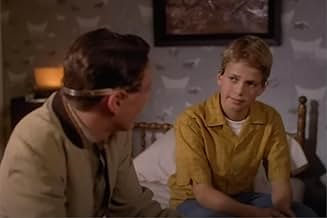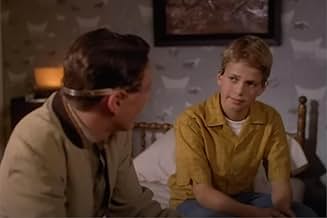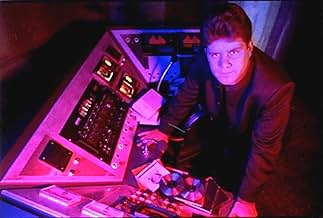VALUTAZIONE IMDb
7,2/10
2801
LA TUA VALUTAZIONE
Aggiungi una trama nella tua linguaIn a distant future, egalitarianism has created a truly equal state. The cost? The sacrifice of everything great about humankind. The question: is peace worth the price?In a distant future, egalitarianism has created a truly equal state. The cost? The sacrifice of everything great about humankind. The question: is peace worth the price?In a distant future, egalitarianism has created a truly equal state. The cost? The sacrifice of everything great about humankind. The question: is peace worth the price?
- Regia
- Sceneggiatura
- Star
- Premi
- 4 candidature totali
Recensioni in evidenza
I saw this movie more than a year ago by chance. I didn't even want to watch it first, but somehow I just got stuck in front of the TV. It was late at night after the Olympics, so i don't think a lot of people saw it. Though I have always loved Sean Astin this movie is certainly a good reason to love him all the more. The "utopia" idea is no new thing in a movie, and usually it's quite interesting how they figure it out eventually. Let's admit: making a good future movie is like walking on eggshells, but I think the cast and crew of this small movie has nothing to be ashamed of. They did really well. It is very impressive how the story of Harrison and of his pure heart and mind talks about life, the equality of men, the lies, the love and of course the arts. I think this movie had become a shiny little secret of the soul of the relatively few people who is lucky enough to have seen it.
Bruce Pittman's intelligent and modest TV adaptation of Kurt Vonnegut's short story is a wonderful and much under-appreciated piece of high sci-fi. Films of this kind are rarely made, simply because there's not much potential audience for low-budget science fiction - most people are in sci-fi mainly for special effects and impressive battles. Harrison Bergeron, though, is one of those few adaptations made of real philosophical sci-fi, the kind that creates an image of the future as a reflection of our own reality. And it succeeds quite well in delivering its message, and for what it is it could be enjoyed by almost everyone - though I doubt it could have done well in the theaters.
The film revolves around two wonderful lead actors - one is Sean Astin, who recently gained success and fame as Sam Gamgee in Peter Jackson's Lord of the Rings trilogy. The other is the wonderful British actor Christopher Plummer, remembered by sci-fi buffs as the Klingon General Chang from Star Trek 6: The Undiscovered Country. Brilliant comedian Eugene Levy gives an eerily funny performance as the President. The story is of a future America in which equality is achieved by discouraging exceptional talent or intelligence and creating forced mediocrity. Harrison (Sean Astin) is one of the exceptional few whose intelligence surfaces despite the government's best efforts and is therefore given the chance to work for the government. There he discovers the timeless Orwellian truth of Fascist regimes - all are equal, but some are more equal than others. Astin's interplay with Clummer (the classic 'Big Brother') is wonderful, and the ending is beautiful. The script does an excellent job of expanding Vonnegut's very short story into a 100 minute film.
Harrison Bergeron is well worth watching - if you can get your hands on it. As far as I know there isn't a DVD available, but the VHS can be ordered on Amazon and the movie plays occasionally on television. If you're interested in science fiction literature of authors like Vonnegut, Philip K. Dick, or Isaac Asimov, this wonderful little think-piece is a good purchase.
The film revolves around two wonderful lead actors - one is Sean Astin, who recently gained success and fame as Sam Gamgee in Peter Jackson's Lord of the Rings trilogy. The other is the wonderful British actor Christopher Plummer, remembered by sci-fi buffs as the Klingon General Chang from Star Trek 6: The Undiscovered Country. Brilliant comedian Eugene Levy gives an eerily funny performance as the President. The story is of a future America in which equality is achieved by discouraging exceptional talent or intelligence and creating forced mediocrity. Harrison (Sean Astin) is one of the exceptional few whose intelligence surfaces despite the government's best efforts and is therefore given the chance to work for the government. There he discovers the timeless Orwellian truth of Fascist regimes - all are equal, but some are more equal than others. Astin's interplay with Clummer (the classic 'Big Brother') is wonderful, and the ending is beautiful. The script does an excellent job of expanding Vonnegut's very short story into a 100 minute film.
Harrison Bergeron is well worth watching - if you can get your hands on it. As far as I know there isn't a DVD available, but the VHS can be ordered on Amazon and the movie plays occasionally on television. If you're interested in science fiction literature of authors like Vonnegut, Philip K. Dick, or Isaac Asimov, this wonderful little think-piece is a good purchase.
This is one of my favorite movies because it makes you think of the "what if" to the nth degree. It ranks up there in my mind with Matrix in terms of challenging your imagination to think outside the world as we know it. It is too bad it was only a made-for-TV movie because I think it would have done as well at the box office as many movies that are much less interesting have. The movie puts us in the future, where the not-so-intelligent have risen up against the intelligent and forced the government to create a mechanism (a head band) for ensuring that all citizens stay at the same level of intelligence - average. Our main character, Harrison, is, much to his family's dismay, above average and, despite the band, cannot contain his intellectual gifts.
Kurt Vonnegut's story turned into an intriguing movie. Not a sci-fi classic but worthy of particular praise for its grim vision of the future. Not a future dominated by machines because man has taught them to evolve (Terminator), nor a future inhabited by docile, lazy epicures who have even lost the ability to read (The Time Machine). This is somewhere in between, a future where the average prevails and where excellence is looked upon with scorn.
After a second civil war, America's leaders have realised that war is idealistic, so they look to an age where ideology was at its lowest point. The golden age of mass consumerism - the 1950s. Children are taught at school to achieve mediocrity, grade C is best, grade A is very bad. Adults are force fed tv with no stimulating content, and strive to buy the newest durable product they see advertised. All brain patterns are controlled by thought suppressing headbands.
The premise is marvellous and keeps the viewer hooked. It is darkly comic, but seriously thought provoking. Not brilliantly acted but certainly worth a look.
After a second civil war, America's leaders have realised that war is idealistic, so they look to an age where ideology was at its lowest point. The golden age of mass consumerism - the 1950s. Children are taught at school to achieve mediocrity, grade C is best, grade A is very bad. Adults are force fed tv with no stimulating content, and strive to buy the newest durable product they see advertised. All brain patterns are controlled by thought suppressing headbands.
The premise is marvellous and keeps the viewer hooked. It is darkly comic, but seriously thought provoking. Not brilliantly acted but certainly worth a look.
It's easy to imagine Mike Judge's hilarious film "Idiocracy" as a dumbed down version of Kurt Vonnegut's "Harrison Bergeron". "Harrison Bergeron" is both darkly humorous, and at the same time frightening. This is intelligent science fiction, that extols the belief that mediocrity for everyone should be the goal of society. The government implements control over citizen's brains with electronic headbands. This diabolical system is overseen by Christopher Plummer, one of a few privileged citizens, not controlled by a headband. Sean Astin is Harrison Bergeron, a rebellious intellectual who tries to overthrow the system. The film has dark comedy, an excellent and appropriate soundtrack, and top notch acting. Recommended sci-fi viewing. - MERK
Lo sapevi?
- QuizHarrison asks "who was that old guy in 'King Lear'?" and is told it's actor Macaulay Culkin. This is meant as a joke, as Culkin was a child actor at the time this movie was made and will be 73 in 2053.
- Citazioni
Harrison Bergeron: Anyway, I don't think you're all that stupid.
Alma Starbuck: Thanks! Well I don't think that you're all that smart.
- ConnessioniFeatures Io... e il ciclone (1928)
- Colonne sonoreLollipop
Music and Lyrics by Beverly Ross and Julius E. Dixson Sr. (as Julius Dixon)
Used by permission of Edward B. Marks Music Co.
I più visti
Accedi per valutare e creare un elenco di titoli salvati per ottenere consigli personalizzati
Dettagli
- Data di uscita
- Paese di origine
- Sito ufficiale
- Lingua
- Celebre anche come
- Гаррісон Бержерон
- Luoghi delle riprese
- Aziende produttrici
- Vedi altri crediti dell’azienda su IMDbPro
Contribuisci a questa pagina
Suggerisci una modifica o aggiungi i contenuti mancanti





























